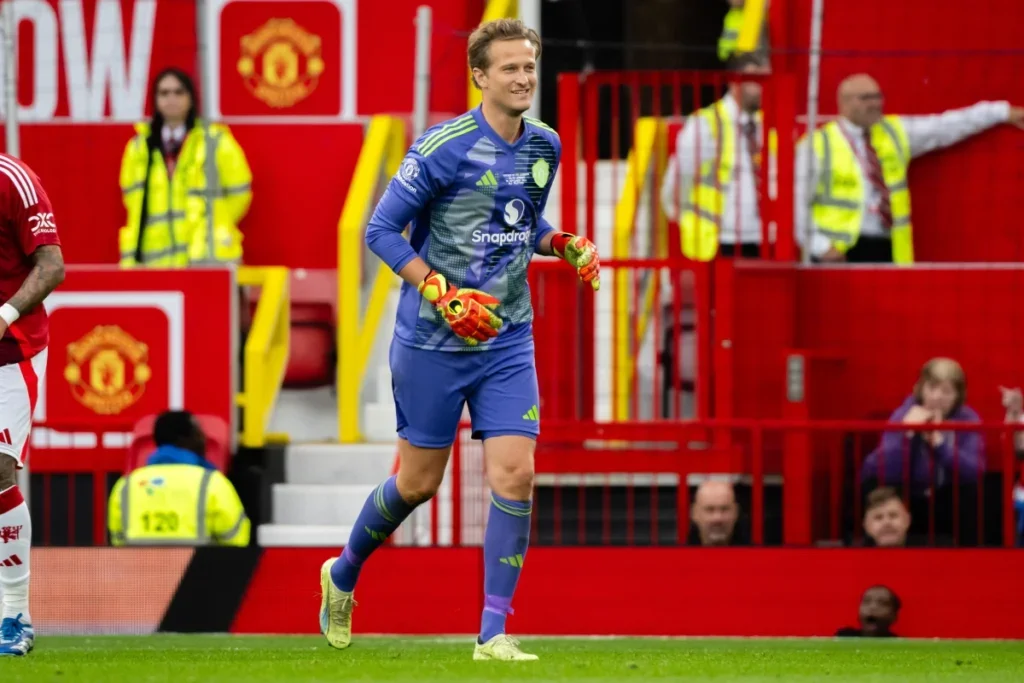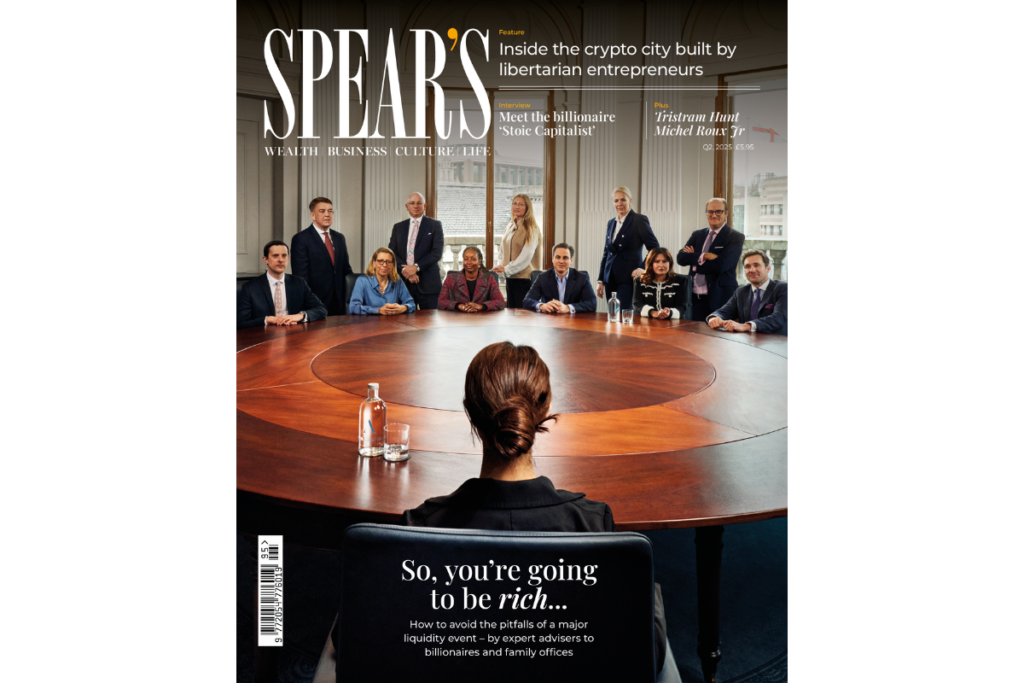
You get the impression UBS has a lot of staff in its many offices around the world who believe they are superstars. Well, the Swiss bank now has a genuine contender: Anders Lindegaard, the decorated former professional footballer, who joined its wealth management division at the end of last year as a ‘business developer’.
The ex-goalkeeper, who spent five seasons with Manchester United playing alongside the likes of Wayne Rooney, Rio Ferdinand and Ryan Giggs, has signed for the bank’s Copenhagen office, calling the move the birth of ‘Anders Lindegaard 2.0’. In his first major interview since arriving at the bank, the 40-year-old tells Spear’s why he joined UBS, what crossovers there are between football and wealth management, and what he learned from legendary football manager Sir Alex Ferguson, who brought the Dane to Manchester in 2010.
[See also: Introducing Spear’s Magazine: Issue 95]
A footballer expiry date
The former premiership title winner says everything he does ‘is impacted by having worked with Ferguson… I think everyone who had the privilege of working for “the boss” is highly influenced by him. He ends up leaving a mark on many aspects of your personality, [such as] how you conduct yourself and how you interact
with your surroundings.’
It appears to have worked. Lindegaard is not your typical footballer; he is articulate and thoughtful, and a reliance on clichés is notably absent. There is no talk of his career being a game of two halves. (Leave the clichés to the journalists – Ed.) He is also reflective, and says he thought long and hard about the next stage of his working life after football.
[See also: Introducing Spear’s Magazine: Issue 95]
‘I’ve always been aware football has an expiry date. Since I was a kid, I knew there had to be a life after my active career – a different life. So I spent a lot of time reflecting upon my football retirement and transition,’ he says. ‘I knew I didn’t want to be a pundit or a coach. I wanted to do something different. I wanted to experience something new, meet different kinds of people, educate myself, learn new skills, and solve new problems.’
From his base in Copenhagen, Lindegaard explains that he started asking himself how life could be better for athletes. How his own life could have been better.
‘I looked to identify problems that didn’t have the right solutions. And I pinpointed financial distress and wealth management,’ he says. ‘When I looked at my own experience, it was clear there were problems in the cooperation between banks and football players. They just don’t speak the same language.’
Indeed, an estimated two-fifths of professional footballers end up bankrupt within five years of retirement, according to Xpro, a body that helps footballers adapt to life once they stop playing.

George Maltby from Cazenove Capital, the wealth management arm of Schroders, says: ‘Professional sport has become synonymous with wealth, fame and a luxurious lifestyle. But in many cases, the period in which an athlete earns an ultra-high income is often short-lived.’
He provides the fictitious example of a retiring player, aged 34, with a young family and £400,000-a-year lifestyle. In his example the portfolio director goes on to assume the player has met the conditions for a final one-year £3 million extension to his contract and has a large family home with no mortgage and £5 million in cash. ‘Despite having one year’s high income ahead of him and sizeable savings in the bank, the player’s family will run out of money by his 47th birthday,’ Maltby says.
[See also: The Spear’s Wealth Management Indices 2024]
This is what ultimately pushed Lindegaard into pitching his services to UBS. ‘I spent a lot of my time thinking about how to do better wealth management from the perspective of professional athletes,’ he says. ‘And, for me, UBS was the best organisation to develop such a proposition because they have wealth management at their core and are very international. Today, I define my job as building a bridge between the world of UBS and the world of athletes. It’s my responsibility to make the bank understand athletes and their unique needs.’
Repaying the supporting village
One of those distinctive needs is the number of people sports stars can end up supporting financially. Unlike many other careers, getting to the top as an athlete might require large sacrifices by family members or friends, who might expect to be rewarded.
Stephen O’Kane from multi-family office AlTi refers to it as ‘supporting the village’: ‘Many successful athletes and artists feel, quite rightly, that their success is owed in part to their community, and they want to share their good fortune. How much, when, and with whom is not an easy question to answer, and it can lead not only to financial difficulties but also strained relationships if managed in a haphazard way.’
[See also: the complete HNW Wealth Managers Index 2024 on Spears500.com]
What specific parallels are there between being a footballer and a wealth manager? Lindegaard comes up with a good answer to this question. As a goalkeeper, he says, he could go 89 minutes without making a mistake, but that one error could undo all the good work he put in.

‘I used to argue that as a goalkeeper I made a career out of analysing complex problems and finding the right solutions within a split second, knowing that success would most often go unnoticed while a mistake would go viral. Those are the brutal facts of what goalkeepers get paid to do. It’s all about not making costly mistakes. Risk management, if you like. Which fits well into wealth management.’
With the PR flanking our conversation about to blow the whistle to mark the end of the interview, I can’t resist asking Lindegaard whether Manchester United can get back to winning ways after cycling through 10 managers without a title win since Ferguson’s departure in 2013.
‘Results in football go up and down but history never changes,’ he says. ‘Man U is one of the most historic clubs on the planet. They will be back on top for sure.’
Advisers bridging sport & finance
Gareth Griffiths; Pro Sport Wealth Management
Retired footballer Gareth Griffiths brings his personal experience to the financial planning advisory he provides to those within sport – who include CEOs, directors, managers, coaches, players and player representatives.
Read Gareth Griffiths’ full profile on Spear’s 500
George Maltby, Cazenove Capital
A portfolio director at Cazenove, George Maltby provides advice on liquidity event planning, wealth structuring, risk management and investment management, helping clients to define their goals and implement long-term strategies.
Stephen O’Kane, AlTi
Stephen O’Kane advises athletes, entertainers and next-gen wealth creators. AlTi provides estate and wealth planning, investment advisory, family governance and impact investing services, and can serve as a client’s family office.
This letter first appeared in Spear’s Magazine Issue 95. Click here to subscribe







